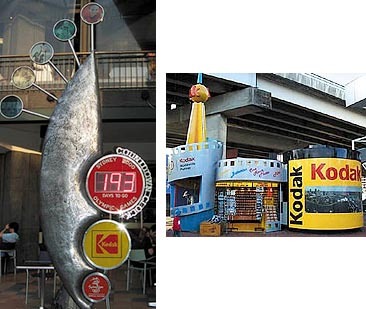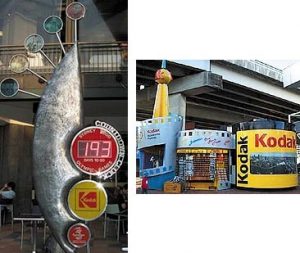From a business view, globalization manifests in two forms: markets and production. To better comprehend this, consider firms, such as Citicorp, Coca-Cola, McDonald’s and Levi Strauss, that create global markets by offering standard products worldwide. Coke is Coke, wherever you buy it, although its particular mix and marketing specifics may vary. Global business, however, is focused on production, not retail markets, and, until you study it, most of us do not realize the scope of this type of business. For example, the Boeing Co. 777 jet airliner, according to Charles W. L. Hill, author of International Business, contains 132,500 major component parts that are produced around the world by 545 suppliers. Note that eight different Japanese firms manufacture parts for the fuselage, doors and wings; the nose-gear door is made in Singapore, and the wing flaps are built by three Italian firms. Boeing’s management team, according to Hill, believes that outsourcing parts production is a good bet because “they are using suppliers that are the best at performing a particular activity.” Hill says the company believes this type of action places them in a more competitive pricing position while obtaining the very best components. Boeing also believes that outsourcing production to foreign countries increases Boeing’s chances of obtaining orders from that country. Call it parts networking. Notice that the major auto manufacturers operate in a similar manner. To cite an instance, the South Korean government lists more than 45 auto parts and supplies manufacturers providing parts not only to its internal firms, but to the shelves of auto parts suppliers worldwide. South Korea is an interesting case study for world trade. The Associated Press reports that DaimlerChrysler will acquire 10% of the shares of South Korea’s leading carmaker, Hyundai Motor Co., for $428 million. This allows the U.S.-German carmaker to manufacture trucks and other commercial vehicles at one of Hyundai’s plants. General Motors Corp., Ford Motor Co., DaimlerChrysler, Fiat and Hyundai are bidding to buy South Korea’s second largest automaker, Daewoo Motor, which is $18 billion in debt and under auction by its creditor banks. It can produce 2 million vehicles a year in plants that range from the Philippines to Poland. Preceding these globalizing industry events, the French company Renault recently bought a 70.1% stake in the South Korean company Samsung Motors Inc. for $562 million. Ten years ago, we saw South Korea as a developing nation. Now, with a strong economy, its firms are major players in many global industries — shipbuilding (according to Kindersley’s World Desk Reference [www.dk.com] South Korea has 45% of the world’s shipbuilding market), steel, electronics and chemicals. As you might expect, the country also has difficulties. Kindersley warns that South Korea’s financial sector is too exclusive, that its indebtedness is at a high level and its workforce is “increasingly militant.” Exclusivity in the finance sector is a part of what caused the 1997 Pacific Rim financial crisis. In spite of this, today’s economic performance indicators show continuing gains and stability. Other than the 1950-1953 Korean war (with 33,629 U.S. deaths) and a shaky relationship with its garrulous northern neighbor, South Korea made little news until 1970. At that time, international economists note that the living standards of South Korea and the West African country of Ghana were comparable. A study, then, of these two nations shows the benefits of international trade. In 1970, Ghana’s per person gross national product (GNP) was, in U.S. dollars, $250 compared to South Korea’s $260. In 1999, South Korea’s per person GNP was $10,550. Ghana’s was $390. You might remember that Ghana once was a prosperous British province — the Gold Coast Crown Colony. It acquired independence from Britain on March 6, 1957, with Kwame Nkrumah as its first prime minister and head of state. Nkrumah skillfully revolted against British rule and soon became the principal leader of not only Ghana, but was the chief figure in a Pan-African movement towards independence from European government. Nothing like this had ever happened before in Africa. Today, the country is known for cocoa and the Ashanti Goldfields Co., an African-based international gold mining and exploration group with six mines in the Ashanti region of Ghana, Guinea and Zimbabwe. Gold is Ghana’s attraction for foreign investments, although U.S. government legal-beagles question the legitimacy of these investments. Most of all, Ghana still suffers from Nkrumah’s closure to the outside world. Ghana’s inflation is 28%, its unemployment 20%. South Korea’s inflation is 4.4% with 4% unemployment. Most striking is that South Korea’s world GNP ranking is 11, whereas Ghana’s is 95. A recent World Bank study says South Korea has historically implemented policies encouraging its companies to engage in international trade. Kindersley adds that a well-educated work force and cheap credit also gave South Korea its start. Ghana, conversely, has discouraged its domestic manufacturers from entering international markets. Furthermore, Ghana’s authorities have traditionally levied high import tariffs and enacted other limiting international trade policies. South Korea has all but eliminated its import tariffs and, by 1980, international trade accounted for 74% of South Korea’s GNP and only 18% of Ghana’s. Hill says free-trade benefits outweigh the costs, that free trade works best when countries export goods and services that they can produce most efficiently and import goods that they cannot produce efficiently. He writes, “According to this view, it makes little sense for the United States to produce textiles at home when they can be produced at a lower cost in Honduras or China. Importing Chinese- or Honduran-made textiles lowers prices for clothes in the United States, which enables consumers to spend more of their money on other items.” It’s the same with South Korean auto parts. Or ships. At the same time, the increased income generated in the exporting country increases that country’s income levels, which, in turn, helps it to purchase more products produced elsewhere, such as the United States. You could say, then, that free trade benefits all countries that adhere to a free trade regime. In summary, even with its in-and-out economic directions, the average South Korean citizen, due to his or her government’s positive attitudes towards world trade, lives a much better life than the average Ghanian. In other words, free trade works.


 Tip Sheet1 week ago
Tip Sheet1 week ago
 Photo Gallery3 days ago
Photo Gallery3 days ago
 Ask Signs of the Times5 days ago
Ask Signs of the Times5 days ago
 Real Deal2 weeks ago
Real Deal2 weeks ago
 Benchmarks1 week ago
Benchmarks1 week ago
 Paula Fargo11 hours ago
Paula Fargo11 hours ago
 Photo Gallery12 hours ago
Photo Gallery12 hours ago
 Women in Signs2 weeks ago
Women in Signs2 weeks ago













